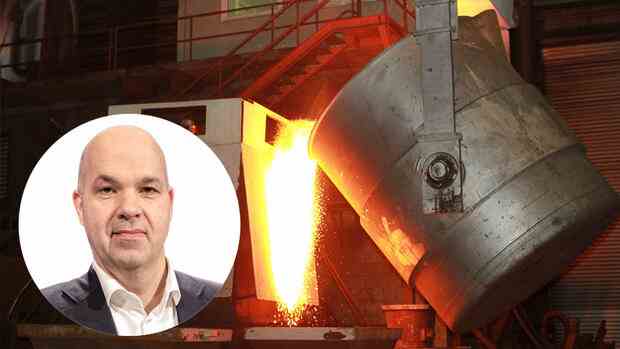Marcel Fratzscher is President of the German Institute for Economic Research (DIW Berlin).
(Photo: Imago (2))
Hardly a week goes by without warning calls from companies. They either report acute existential fears or announce that they want to relocate activities abroad. The specter of de-industrialization is looming over the country.
How seriously do we need to take this concern? Current figures do not indicate that the demise of entire branches of industry is imminent. Nevertheless: If the German economy continues to sleep through the ecological transformation and digitization, deindustrialization could actually become reality in ten to 15 years.
There are four good reasons why deindustrialization is highly unlikely in the next two or three years. First of all, we are not currently seeing a wave of corporate bankruptcies. Even though numerous smaller companies had to close, a large part of the economy is remarkably resilient.
In the short term, deindustrialization is very unlikely
Secondly, the profitability of many medium-sized and large companies is surprisingly good in this crisis. Some Dax companies are even making record profits. The structure of the German economy, which is characterized by medium-sized companies, has already proven to be a great strength in previous crises, because a large part of the companies have a long-term orientation and act averse to risk.
Top jobs of the day
Find the best jobs now and
be notified by email.
In general, the damage to companies from the crisis does not depend so much on how the prices of their inputs develop. Much more relevant is the question of the extent to which companies can pass these higher costs on to their customers. Current surveys by the Ifo Institute show that many companies have not only passed on the higher costs to customers, but have also been able to increase their profit margins.
When corporations relocate production abroad, it also secures highly productive jobs in Germany
Thirdly, the still good order situation and the global competitiveness of companies speak against a short-term deindustrialization in Germany. Many German exporters have always been characterized by the fact that they offer highly specialized products and services that have little competition in international competition. This also makes it easier on a global level to pass on higher prices and to maintain one’s own market niche.
>> Read here: Ottmar Edenhofer – “We should resolutely oppose deindustrialization”
When companies like BASF relocate large productions abroad, it fuels fears of deindustrialization. Basically, however, such decisions have exactly the opposite effect: when companies relocate energy-intensive production abroad, they become more efficient and are therefore better able to secure highly productive jobs in Germany.
In the past 25 years, most DAX companies have invested heavily abroad. Creating jobs there always served to maintain the location in Germany.
The fourth reason relates to the role of the state in the crisis. The federal government has given German companies massive financial support – so much so that many of our European neighbors are right to complain about unfair competition.
When companies move large productions abroad, it fuels fears of deindustrialization. Basically, however, such decisions have exactly the opposite effect.
Hardly any other industrialized country has launched such large aid packages as Germany in the recent crises. Most of this goes to companies, not private households, as is the case with the aid payments provided for under the gas price brake.
The German car industry shows what happens when companies rest on their laurels
All of this suggests that those concerned about the possible deindustrialization of the German economy should not focus too much on the impact of the current crisis. Rather, it is important for companies in Germany to recognize the signs of the times and to decisively advance the ecological and digital transformation.
The German automotive industry shows how quickly former global champions can fall behind when they want to rest on their laurels and perpetuate the status quo.
Deindustrialization is a real threat. One of the biggest challenges is to provide a sufficient amount of renewable energy in the next ten years. Otherwise energy prices will remain high and the chances of success for the transformation will be significantly reduced.
The state must also set the right framework conditions to ensure that companies do not approach the ecological transformation and digitization too hesitantly and invest sufficiently in their own future. Ultimately, however, it is primarily up to companies to orient themselves to the new economic realities and to break away from old habits and achievements in good time.
The author:
Marcel Fratzscher is President of the German Institute for Economic Research (DIW Berlin) and Professor of Macroeconomics at Berlin’s Humboldt University.
More: Three scenarios for the future of German industry
